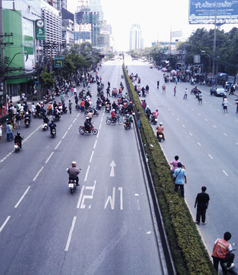Bangkok, Thailand — Just one week ago, the political strife crippling Bangkok was poised to end.
But Friday, the city’s main thoroughfares were lit by burning tires. Masked men in motorbike helmets yanked soldiers from trucks. Ambulances idled outside conflict zones, waiting for the next protesters to fall dead from live rounds. More than 37 have died and well over 1,000 have suffered injuries.
Here’s a taste of what parts of Bangkok looked like Friday night:
A proposed settlement between protesters known as “Red Shirts” and the military-backed Thai government has now completely broken down. As both sides take casualties, it appears impossible for either to emerge with a clear victory.
Pressure has mounted in recent weeks against Thai Prime Minister Abhisit Vejjajiva — not only from protesters, but from urban Thais eager to see them pushed out by force.
The premier has maneuvered for a political resolution — offering to hold early elections more than a year ahead of his term’s end — but has stopped short of answering all of the Red Shirts’ demands. They have vowed to fight on until he and his deputy are held criminally responsible for April army raids that left protesters dead.
Even as core Red Shirt leaders lambaste Abhisit as a “tyrannical murderer,” there is a parallel perception among many that the premier is too gutless to go hard on protesters.
“Clearly, people in Bangkok are fed up,” said David Tuck, head researcher for the Spectrum OSO Asia risk intelligence firm in Bangkok.
“I’ve wondered about this reluctance from the government,” he said. “Do they just not want to end with any blood on their hands? Certainly people on the Red Shirt side … are prepared to use violence and they’ve been effective at it.”
Throughout, Red Shirt speechmakers have beckoned their followers to enter a “fight to the death” with the government. Key leader Nattawut Saikua has even spoken of “fighting gun barrels with bare hands.”
Their movement of self-described “commoners, they say, must go on until a system of double standards enforced by “aristocrats” is toppled.
They often evoke the 2006 military coup against ex-Prime Minister Thaksin Shinawatra, now in self-imposed exile, and the concurrent dismantling of his two allied parties for fraud. Abhisit came to power in 2008 after a Red Shirt-supported party was dissolved under corruption charges.
Now, as parts of Bangkok slip into chaos, the do-or-die rhetoric has come to life.
The fighting has only intensified since the mysterious shooting of a renegade general, Maj. Gen. Khattiya “Seh Daeng” Sawisdipol. The general, now in a coma, had publicly cursed his superiors and sworn to defend the Red Shirts with his own militia.
Despite the images of mob rule surrounding their rallies, the Red Shirts remain an influential force among working-class Thais and those living in the populous rice-farming northeast. The movement’s leaders have good reason to believe that their favored political party, Peua Thai, could win the next election.
But the movement has shied away from articulating its own policy objectives beyond toppling connected aristocrats.
“Their immediate policy and strategy is to end this government,” said Thitinan Pongsudhirak, political science professor with Bangkok’s Chulalongkorn University. “Once that takes place, they’ll need to come up with what kind of Thailand they see ahead and they’ll need to sell that to the other segments.”
That support, however, will be jeopardized the longer their rallies disrupt the Thai capital, Tuck said.
“You’ve got to maintain a balance,” he said. “You’ve got to make people take notice of your views but not to the extent that they get fed up and think you’re pathetic. The Red Shirts are way past that now.”
Join us in defending the truth before it’s too late
The future of independent journalism is uncertain, and the consequences of losing it are too grave to ignore. To ensure Truthout remains safe, strong, and free, we need to raise $44,000 in the next 6 days. Every dollar raised goes directly toward the costs of producing news you can trust.
Please give what you can — because by supporting us with a tax-deductible donation, you’re not just preserving a source of news, you’re helping to safeguard what’s left of our democracy.
